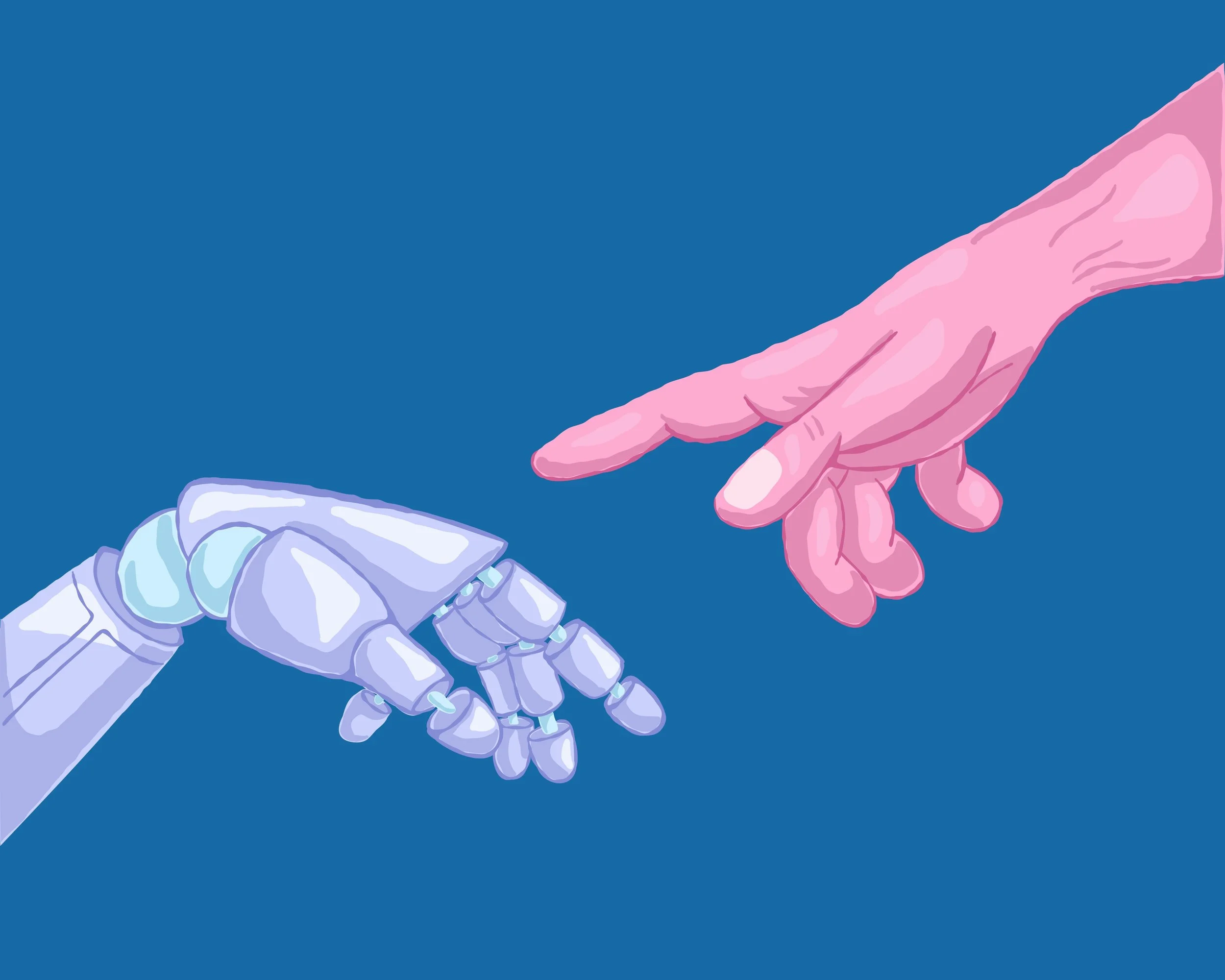Collaborative Intelligence - How AI Can Help Us Find Our Humanity
The Paradox of Progress
We hear it often that AI will make us faster, smarter, and more efficient. And yes, in many ways, it will. But beneath the headlines and hype, there’s a quieter story worth paying attention to.
Because in the race to automate, accelerate, and optimise, something unexpected is happening. We’re being offered space.
Not just to get more done, but to be more present.
To pause. To think. To feel.
To return to the parts of work that make us deeply, unmistakably human.
The conversations that build trust. The moments of empathy that shift a relationship. The presence it takes to truly listen.
What if AI’s real gift isn’t speed, but presence?
Not just helping us work better, but making room for us to lead, connect, and show up with more intention.
Reframing AI: Not a Replacement, but a Collaborator
For many, the idea of AI stirs a quiet concern. There’s a lingering thought that it might replace us, that as machines become more capable, our own value could diminish. It’s an understandable fear, especially in a world that often treats progress as a zero-sum game. But what if we looked at it differently?
What if AI isn’t here to replace us, but to return something we’ve lost?
When AI steps in to handle the repetitive and reactive, sorting data, managing calendars, drafting first versions, it doesn’t push us aside. It opens the door for us to re-engage with the parts of work that require heart and presence. The kind of work that relies on empathy, judgement, creativity, and connection.
Seeing AI as a collaborator means recognising that we don’t have to do it all alone.
It’s not about machines taking over, but about creating space for people to lead with intention. When we work alongside AI, we’re not diminished.
We’re made more available for the things that truly make us human.
The Human Skills That Matter More Than Ever
As technology grows louder, human connection feels even more essential.
In many workplaces, the most meaningful moments aren’t happening in performance reviews or strategy decks. They’re in the quiet check-ins, the conversations after a tough meeting, the pause to ask how someone’s really coping.
These are the moments people remember.
The ones that build trust and belonging. And now, with AI taking on more of the cognitive load, we’re being given a choice: fill that space with more tasks, or use it to reconnect with what matters.
Emotional intelligence becomes a cornerstone. It’s the ability to stay grounded when tensions rise, to read the room before reacting, to offer calm when others can’t. It’s not flashy, but it’s deeply felt.
Listening, too, takes on new weight. Not the kind that waits for its turn to speak, but the kind that makes someone feel understood without needing to be fixed. In a fast-moving world, that kind of listening slows everything down in the best possible way.
Mentoring and coaching aren’t add-ons. They’re part of how we lead now by guiding others, sharing wisdom, and investing time in someone else’s growth.
And sometimes, it’s something as simple as presence. A question like “How are you really?” asked with genuine care, can change the shape of someone’s day.
These skills have always mattered. But now, they’ve become the clear difference.
AI can write the report, schedule the meeting, and even offer a helpful response. But it can’t look someone in the eye after a difficult day and say, “You’re not alone.”
It can’t sense the pause in someone’s voice and follow up gently.
It can’t recognise when a team needs encouragement instead of efficiency.
That’s the space only humans can fill, and it’s what people remember. Not just what you delivered, but how you made them feel while doing it.
In a time when almost anything can be automated, it’s our presence, empathy, and care that remain irreplaceable.
Time, Culture, and the New Shape of Leadership
For years, leadership was measured by how much you could handle, how many emails you answered, how quickly you responded, how long you stayed online. But the real currency of leadership is changing. It's no longer about being everywhere at once. It's about being present where it matters most.
AI can give us speed. But the deeper opportunity is the time it returns to us, time to lead with more care, more attention, more awareness. When you’re no longer drowning in admin or chasing tasks, you have the space to ask better questions, to sit in uncertainty, to actually hear what’s being said between the lines.
And that shift doesn't just affect individuals. It reshapes culture. Because culture doesn’t live in slogans or offsites. It takes shape in the everyday, in how people listen to each other, respect each other’s time, and respond when things don’t go to plan. In how feedback is given. In how boundaries are respected. In how trust is earned.
The promise of AI is not just what it can do. It’s what it can free us up to do better. Empathy. Creativity. Presence. These aren’t just buzzwords. They’re the foundations of cultures that last.
Leaders now have a choice: automate the busywork and reclaim the human work. That’s where culture begins and where it has the power to grow.
Closing Thought: The Humanity Multiplier
We often talk about AI as a tool to make us more productive.
But maybe the deeper opportunity is this:
What if it also gives us the chance to become more human?
Not just in how we work, but in how we lead. How we relate. How we show up for each other.
Because as technology becomes more capable, the value of our emotional presence, our empathy, our ability to create meaning. These things become more visible, not less.
AI might be the innovation.
But we are the multiplier.
And the real shift won’t come from what AI can do.
It will come from how we choose to use the time it gives us and how intentionally we bring our humanity to the moments that matter.
What we do with that space will shape not just our work, but our culture.
And maybe that’s the future we’ve been waiting for all along.


